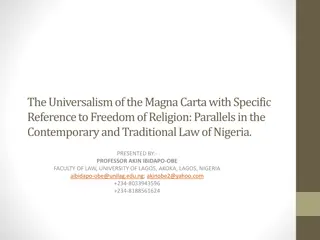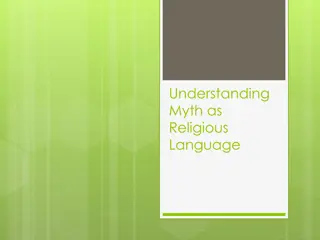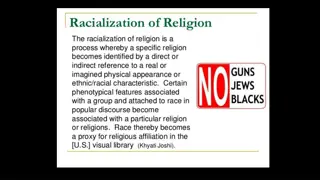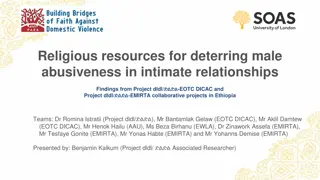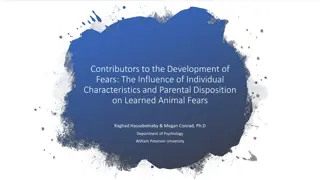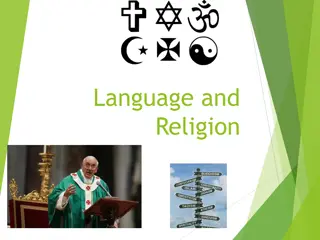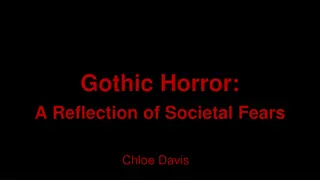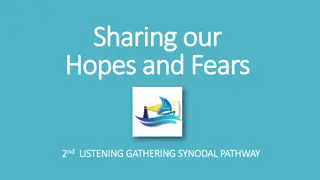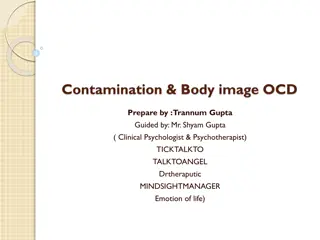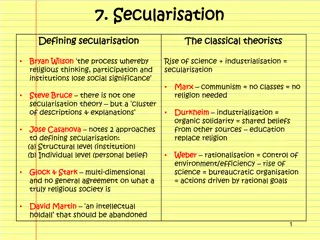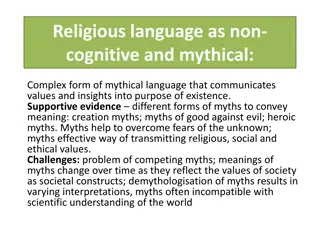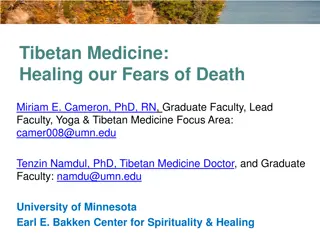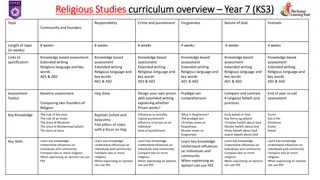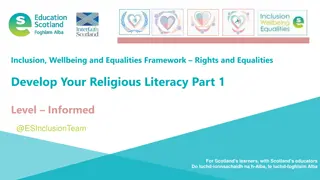Understanding Interfaith Harmony in Islamic Education
The third meeting conducted by the Islamic Education Faculty covered topics such as classroom regulations, tolerance among different religions, the concept of harmony among religious communities, and general challenges related to diversity in religious interpretations. The importance of maintaining
2 views • 13 slides
Status of Family Laws in India: Hindu vs. Religious Minorities
The family and personal status laws in India vary between Hindu law and those pertaining to religious minorities. While Hindu law has seen extensive reforms, discriminatory provisions still exist. In contrast, laws governing religious minorities have undergone fewer reforms, leading to greater inequ
2 views • 4 slides
The Universalism of Magna Carta: Freedom of Religion in Contemporary Nigerian Law
Magna Carta, a pivotal human rights document, is explored with a focus on its religious underpinnings and its influence on modern legal systems. The parallels and divergences between Magna Carta and Nigerian customary law regarding freedom of religion are examined. The implications of contemporary N
0 views • 16 slides
Religious Education Skills Progression for Years 5 and 6
This document outlines the long-term plan for the RE curriculum for Year 5 and 6 students, focusing on topics such as living by Christian values, exploring wisdom from different faiths, understanding the creation of the world, and expressing faith through art. It also covers the progression of skill
0 views • 31 slides
Religious Policies of Queen Elizabeth I: Seeking a Middle Way
Queen Elizabeth I of England navigated religious turmoil by establishing a middle way that balanced Protestant and Catholic elements. Her reign saw the passing of acts like the Act of Supremacy and Act of Uniformity to consolidate her power and create a distinct Church of England. Despite facing opp
0 views • 21 slides
Understanding Religious Conflict: Definition and Types Explored
Religious conflict is a complex and recurring concept throughout history. Scholars have defined it as disagreements between religious groups. This conflict arises from contentious issues touching on ideology, morality, power, and identity, influenced by various socio-political, economic, and cultura
1 views • 13 slides
Understanding Myth as Religious Language: Exploring Concepts and Interpretations
Explore the multifaceted nature of myths as religious language, delving into their equivocal definitions, truth claims about God, and use of rhetorical devices. Discover the significance of myths in providing human understanding of God, revealing divine attributes, and addressing fundamental questio
0 views • 17 slides
Overview of Religious Studies Course at Ramsey Grammar School
The Religious Studies course at Ramsey Grammar School for Year 9 students covers topics such as Christianity, Islam, Life and Death, Good and Evil, beliefs, practices, and church diversity. Students will be assessed through a written examination at the end of Year 11, with no coursework requirement.
0 views • 23 slides
Evolution of Akbar's Religious Policy: A Historical Overview
In the 16th century, Akbar the Great implemented a revolutionary religious policy in the Mughal Empire. Initially a devout Sunni Muslim, Akbar evolved his stance to promote harmony and equality among all religions, fostering tolerance and understanding. This shift marked a significant departure from
1 views • 25 slides
Embracing Religious Pluralism for a Harmonious Society
Educate yourself on world religions and religious oppression, empathize with religious minorities, combat generalizations, and promote belief inclusion in all aspects of life for a more just and peaceful world.
0 views • 6 slides
Religious Resources for Deterrence of Male Abusiveness in Intimate Relationships
This research project, conducted in collaboration with various organizations and experts, delves into the role of religion in deterring male abusiveness within intimate relationships. Findings suggest that religion can serve as a deterrent at both individual and normative levels, emphasizing faith-b
0 views • 9 slides
Elizabethan Religious Settlement: Unity Amidst Division
Amid religious division in England, Queen Elizabeth I implemented a Religious Settlement in 1559 to unify the country. The settlement, a blend of Protestant and Catholic elements, aimed to maintain peace and prevent rebellions. Elizabeth's strategic compromise pleased most people, though lingering t
0 views • 14 slides
Understanding Secularism: Principles and Advantages
Secularism is the principle of separating government institutions from religious entities to ensure equal rights for believers and non-believers. It safeguards freedom of religious belief and practice, upholds religious freedom, and promotes democracy and fairness. Secularism aims to prevent religio
0 views • 21 slides
Choose to be Awesome: Embracing a Positive Attitude for Success
Explore the power of choosing a positive attitude towards your favorite subjects, hobbies, and sports. Reflect on whether you embody the traits of a "Kid Average" or a "Kid Awesome," and consider how perseverance and dedication can lead you to greatness despite setbacks or fears. Engage in discussio
0 views • 12 slides
Understanding Religious Language: Cognitivism vs. Non-Cognitivism in the University Debate
This discussion explores the debate between cognitivism and non-cognitivism in religious language. Cognitivism asserts that religious claims aim to describe the world and can be true or false, while non-cognitivism argues that such claims express attitudes and cannot be verified. Flew's challenge qu
0 views • 9 slides
Guide to Using the BSA Calendar of Religious Observances
The BSA Calendar of Religious Observances is a valuable resource for scheduling scouting events in consideration of various religious holidays and observances. This guide provides an overview of the calendar, highlights important dates, and emphasizes the importance of respecting religious diversity
0 views • 8 slides
Understanding Social Anxiety and Avoidant Behaviors
Social anxiety involves intense fear and avoidance of social situations, leading to catastrophic thinking and physiological reactions like performance anxiety. Individuals may anticipate criticism, rejection, or embarrassment, which can interfere with their functioning. This condition can manifest a
3 views • 30 slides
Understanding the Development of Fears: Individual and Parental Influences
Exploring the impact of individual characteristics and parental dispositions on learned animal fears, this study delves into the prevalence of phobias, the development of fears and phobias, fears through the transmission of information, and the role of these factors in childhood fear acquisition. Th
0 views • 23 slides
Understanding Healthy and Unhealthy Fears in Light of Scripture
Exploring the concept of fear as depicted in biblical verses, this content highlights the importance of a healthy fear of God for wisdom and understanding. It contrasts healthy fears that lead to blessings with unhealthy fears driven by human standards and reactions. Encouragement is given to overco
0 views • 13 slides
Understanding the Role of Language in Religion
Exploring the significance of language in religious contexts, this content discusses the functions, features, lexicon, grammar, and metaphorical aspects present in religious language. It delves into how religious language upholds spiritual beliefs, persuades believers, and expresses specific attitud
0 views • 8 slides
Gothic Horror: A Reflection of Societal Fears and Its Influence in Young Adult Literature
Gothic horror, as reflected in media creations like Dracula and Twilight, serves as a mirror to societal fears. Through themes of darkness, supernatural elements, and exploring anxieties, the genre provides a safe space for societal introspection. This content delves into how Gothic horror motifs in
0 views • 10 slides
Understanding the Cultural Dimensions of Food and Religious Influences in Culinary Arts
Explore the impact of religious beliefs on food traditions and dietary restrictions across different cultures in the culinary world. Learn about the influence of major world religions on eating habits, food choices, and culinary practices. Discover how various religious groups, such as Christians, o
0 views • 26 slides
The Vital Role of Religious Institutions in Supporting Immigrants
Religions and immigration are interlinked in modern societies, where religions play a significant role in providing services, defending rights, and supporting the social cohesion of immigrants. Mainstream religious institutions serve as key actors in offering assistance, advocating for migrant right
2 views • 14 slides
Understanding Religious Language: Flew, Hare, Mitchell
Exploring the contrasting views of cognitivism and non-cognitivism in the context of religious language through the perspectives of Flew, Hare, and Mitchell. Delve into Flew's challenge on the undetectable gardener, Hare's concept of bliks, and Mitchell's response to the rationality of religious bel
0 views • 7 slides
Religious Accommodation in the Army: Advising Command
The content discusses the role of the Chaplain Corps in advising Soldiers and leaders on religious accommodation in the Army as of February 13, 2019. It covers learning objectives, legal foundations, Army policies, procedures, recent changes, and references related to religious accommodation. The in
0 views • 36 slides
Moments of Reflection and Prayer in a Pathway of Sharing Hopes and Fears
Delve into the moments of reflection and prayer as part of a gathering focused on sharing hopes and fears, inviting participants to listen deeply, understand one another, and embrace the guidance of the Holy Spirit. The synodal pathway emphasizes unity, truth, and the pursuit of what is right throug
0 views • 16 slides
Understanding Contamination OCD: Symptoms, Obsessions, and Misconceptions
Contamination OCD is a subset of OCD characterized by severe fears of becoming contaminated by germs or getting sick. Individuals with this condition may exhibit compulsions such as avoidance, excessive washing, and health testing. It's crucial to differentiate between normal intrusive thoughts and
0 views • 21 slides
Understanding Religious Discrimination Laws in California Workplace
Learn about the regulations and protections under FEHA and Title VII in California, including religious exemptions, accommodation requirements, case studies, and best practices to address discrimination issues effectively. Discover the statistical insights on religious discrimination complaints and
0 views • 45 slides
Understanding Secularisation: The Decline of Religious Influence in Society
Secularisation refers to the process in which religious thinking, participation, and institutions lose their social significance. This phenomenon is influenced by factors such as the rise of science, industrialisation, changing social attitudes, and the disengagement of the church from society. Evid
0 views • 8 slides
Exploring the Role of Myths in Religious Language
Religious language is often non-cognitive and mythical, using complex forms of myths to communicate values and insights into the purpose of existence. These myths, such as creation myths and myths of good versus evil, help transmit religious, social, and ethical values while also addressing fears of
0 views • 20 slides
Philosophers' Views on Religious Experience: Insights and Critiques
This lesson delves into the perspectives of various philosophers such as Rudolph Otto, Richard Swinburne, John Hick, and Michael Persinger on religious experiences. It explores concepts like the numinous, religious knowledge, God's existence, and criticisms on the validity of religious experiences.
0 views • 7 slides
Philosophers' Views on Religious Experience: Insights from William James
Explore William James' perspective on religious experiences, including his views on existential and value judgments. Understand how James argued for the validity of religious experiences and their potential proof of God's existence. Delve into the implications of emotions and prior beliefs on interp
0 views • 7 slides
Religious and Social Conflicts Fueling the Rise of Absolutism in Europe
Social, economic, and religious conflicts in Europe played a significant role in the emergence of absolutism where monarchs wielded supreme power without sharing it with legislative bodies. Events like Spain's religious conflicts, Protestantism in England, the Spanish Armada, religious conflict in t
0 views • 10 slides
Religious Pluralism and Civil Society: A Paradox in Government Control
Understanding the intricacies of religious pluralism in the context of government control reveals a paradox where restricting religion can hinder social cohesion and economic growth. Through insights on the counterproductivity of control, the role of religious organizations in civil society, and the
0 views • 16 slides
Understanding Tibetan Medicine's Approach to Healing Fears of Death
Exploring the ancient healing art of Tibetan Medicine in addressing fears of death, this article delves into the work of Miriam E. Cameron and Tenzin Namdul from the University of Minnesota. Through courses, publications, and practices like Tonglen Meditation, they aim to transform suffering into he
0 views • 18 slides
US Religious Freedom Restoration Act (RFRA) Overview
The US Religious Freedom Restoration Act (RFRA) aims to protect the free exercise of religion by ensuring that governments do not substantially burden religious practices without compelling justification. It emphasizes striking a balance between religious liberty and governmental interests through t
0 views • 9 slides
Understanding the Nocebo Effect in Communicating Nuclear Waste Disposal with SME Communities
This research explores the impact of the nocebo effect on ethical practices when communicating nuclear waste disposal to small and medium-sized enterprise (SME) communities. It aims to evaluate and reduce potential fears caused by misinformation on radioactive waste management. The study delves into
0 views • 10 slides
Religious Studies Curriculum Overview for Year 7 and 8 (KS3)
Explore various topics such as responsibility, crime and punishment, forgiveness, nature of God, festivals, community, founders, worship, creation, life after death, rules and laws, relationships in this detailed Year 7 and 8 (KS3) Religious Studies curriculum. The curriculum includes assessments, e
0 views • 6 slides
Developing Religious Literacy for Educators in Scotland
This resource aims to enhance educators' understanding of religious literacy by exploring religious discrimination, core beliefs of major faiths, and additional learning sources. It encourages educators to consider the needs of learners in relation to their religious beliefs in Scotland.
0 views • 30 slides
Settling the Northern Colonies: Religious Transformation and Colonization
The Protestant Reformation led to the emergence of Puritanism in the Northern Colonies, with figures like Martin Luther and John Calvin shaping religious beliefs. The Massachusetts Bay Colony stood as a beacon of self-government and religious ideals, while dissenters like Anne Hutchinson and Roger W
0 views • 9 slides


